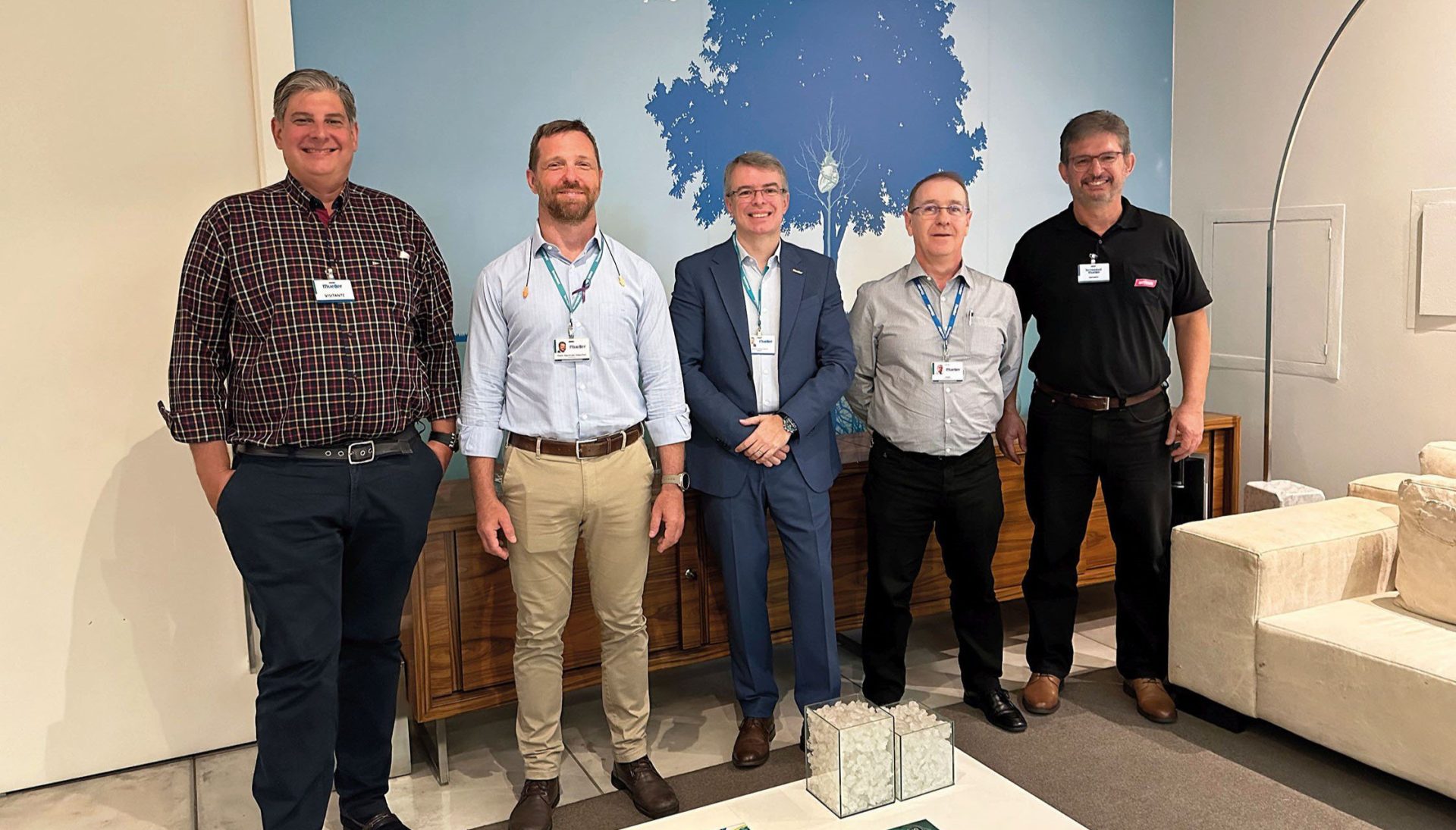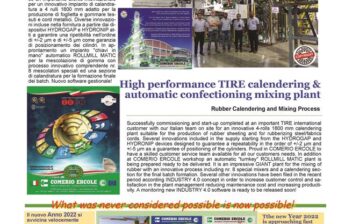As a long-standing partner of Brazil’s well-known major automobile manufacturers, Mueller/Tecnoplast faces the daily challenge to combine first-rate quality with maximum efficiency. The technological means to meet this challenge come from injection moulding solution partner WITTMANN.
Two large, black injection-moulded parts are what Alexandre Ramos, director of Mueller/Tecnoplast, presents to us on the factory tour during our visit in São Paulo City. The larger of the two has just come off the clock out band from a MacroPower 650 injection moulding machine. They form a glove compartment with its lid, which the Mueller division is producing for the Toyota plant in Sorocaba, just 100 kilometres away.
These two parts are typical examples of the company’s product range. Mueller/Tecnoplast produces parts almost exclusively destined for the automobile industry. These include many large components, such as glove compartments or, for example, fender liners and mudguards. Here, the MacroPower from WITTMANN is the preferred machine model.
As Ramos explained, injection moulding of glove boxes and their lids places extremely high demands on precision and surface quality: “These two parts are joined together by vibration welding. To get a good weld seam, their geometries must be perfectly matched.” In this case, “good” does not just mean that the weld seam looks clean, but above all that it lasts for a long time, even when the vehicle achieves a long service life and is subjected to vibrations caused by rough roads.
Perfectly reproducible surfaces
With its extremely accurate servo-hydraulic movements and highly consistent injection processes, the MacroPower 650 makes the most of its strengths in producing these parts. Especially combined with Flowcon plus, the intelligent water flow regulator from WITTMANN. This device controls all cooling circuits and detects any disruptive factors such as blocked cooling channels or flow quantity fluctuations. Via proportional valves, the system then automatically compensates these irregularities during ongoing production, accurately down to the tenth. In this way, the temperature remains evenly distributed inside the mould. The result is a very high consistency in quality.
“This task could not be accomplished manually, since variations in temperature control conditions only rarely show an immediate effect,” explained Marcos Cardenal of WITTMANN BATTENFELD do Brasil. “But with this intelligent assistance system, Mueller/Tecnoplast can intervene before scrap is produced and thus save both raw material and energy.
The high reproducibility of the surfaces is so very important, because these are visible components required to match precisely the look of the dashboards, which are produced elsewhere.
“When it comes to colour and gloss, we have zero tolerance,” said Ramos. It was six years ago when Mueller received its first order from Toyota to produce glove compartments. Meanwhile, the processor has become the sole supplier of this interior component for all Toyota models manufactured in Brazil. “We have never had any discussions about quality issues over all these years. The glove compartments are really a success story.” One of many – for the corporate history of Mueller/Tecnoplast is closely linked to the development of the automotive industry in Brazil.
A top provider in plastics injection moulding
Both MacroPower and SmartPower injection molding machines from WITTMANN are being used to produce headlights, rear lights, reflectors, lenses and light guides for the business segment of Automotive Lighting.
“Mueller and Tecnoplast are pioneers in plastics injection moulding in Brazil. During the early 1950s, these companies were the first to supply the rapidly developing automobile industry in this country with plastic parts,” reported Alexandre Ramos, who has had a hand himself in shaping the company’s history for the last 25 years – for a long time as sales and purchasing manager, before he was appointed director of today’s companies by the owners in 2018.
Established in 1937 by Dr. Fritz Jacob, a German emigrant, the company first made a name for itself with household goods, manufactured primarily from metallic materials at the time. In the mid-twentieth century, the new polymeric materials provided new opportunities and extended the product portfolio, thus shifting the focus of the industry. Now they can look back on decades of cooperation with partners such as Ford, Volkswagen, Scania Latin America and Toyota.
Automotive lighting opens up new perspectives
Mueller/Tecnoplast uses MacroPower machines from WITTMANN to produce glove compartments for Toyota.
Detecting and making use of new opportunities – this virtue is firmly anchored in the DNA of Mueller/Tecnoplast. A business segment still in the making is automotive lighting, with good growth potential due to the increasing commitment of Japanese automobile manufacturers in South America. For several years now, Japanese companies have been creating a considerable stir in the market. New demands, but also more automotive suppliers are coming into the country. But even though competition is increasing, Alexandre Ramos sees this as a positive development: “I don’t intend to be the only one here, I’d rather be part of a strong production chain. After all, as the director I’m not only responsible for the company and its associates. It is very important for me to contribute to the further advancement of our country and our society as well.
Headlights, rear lights, reflectors, lenses and light guides are less and less often imported, but increasingly produced locally. Tecnoplast has established another mainstay for the group of companies with these product lines. Both polycarbonate and PMMA are being processed. “For this purpose, we need the best injection moulding technology.”
Material-friendly plasticising
With this new business segment, the first SmartPower injection moulding machines, also from WITTMANN, were added to the machinery. But the MacroPower machines, long proven in the company, are in use here as well. Vehicle lighting has now become a design element. In some cases, very long light guides are needed – a trend which increases the size of moulds.
To combine first-class optical quality with processing efficiency, WITTMANN delivered the SmartPower and MacroPower machines destined for the lighting business segment with Optimelt low-compression screws specially developed for this field of application.
“Optimelt screws ensure a gentle plasticising process to preserve the material undamaged,” said Cássio Luis Saltori, managing director of WITTMANN BATTENFELD do Brasil. “Even in the event of brief production interruptions, ongoing production can be continued without any risk of start-up scrap.”
On course towards CO2-neutrality
A total of 54 injection moulding machines are standing on the production floor of Mueller and Tecnoplast in São Paulo. Most of these have come from WITTMANN, or WITTMANN BATTENFELD, as the WITTMANN Group’s injection moulding machine division was called until recently. As an overall system supplier, at Mueller/Tecnoplast, WITTMANN is responsible for the entire equipment, including injection moulding machines as well as automation and auxiliaries, ranging from granulate feeding devices right up to granulators for in-line grinding and recycling of sprue.
“For us, WITTMANN is an important contributor to our high competitiveness,” Alexandre Ramos emphasised. And this concerns not only quality standards but also efficiency, which is due to several different factors. One of these is the high area productivity provided by the MacroPower machines. Compared to large machines of other brands, the two-platen machines from WITTMANN with their generously dimensioned mould platens take up only modest amounts of space.
“In this way, more machines fit into the hall,” Ramos concluded. “Here we are not in an industrial zone, but in the middle of a city, where industrial properties are very expensive. Compact machines and production cells mean that we can continue to grow for quite a while without having to extend our building.”
Quite apart from this, sustainability is gaining more and more significance and can be improved by way of material and energy efficiency. In São Paulo, material and energy consumptions are recorded, analysed and optimised systematically. For this purpose, the machines already deliver a lot of valuable data today.
“We can see that the WITTMANN machines consume very little energy compared to other machines in our plant.”
To collect even more specific data in future and to be able to evaluate these more easily, the Group is currently installing software solutions from WITTMANN Digital, such as the TEMI+ MES. The automobile industry drives its suppliers at high speed towards CO2 neutrality. With Toyota, for example, Mueller has signed a joint commitment to that effect. The individual actions to be taken go beyond injection moulding production. For instance, transport packaging for both moulded parts and raw materials is being minimised more and more and re-used wherever possible. Milk run optimisation is also underway.
Always quickly on site
“The WITTMANN machines make work very easy for our technical staff,” continued Alexandre Ramos, meaning not only the robust design of the machines with clever features for easy maintenance and servicing. The manager is thinking primarily about the technical support the companies receive locally in São Paulo. WITTMANN BATTENFELD do Brasil is only an hour’s drive from the Mueller/Tecnoplast production plant.
“We can always get help very quickly.” This is a great incentive for us to choose WITTMANN again and again for any new projects. ”The companies Mueller, Tecnoplast and WITTMANN are linked by a long-standing, very close partnership – and one that goes beyond the borders of Brazil, according to Ramos.
“Michael Wittmann welcomes me just as cordially whenever I am in Austria, as Marcos and Cássio do here in Brazil. We keep in close contact with the corporate headquarters concerning technical matters, too. Our projects and issues are known there, and I know that the management in Austria is solidly backing its team in Brazil. That gives me a very good, secure feeling.”
To make sure that his own production staff can fully exploit the potential of WITTMANN technologies, Alexandre Ramos sends them regularly to training courses. Of course, to the training center at the local WITTMANN subsidiary close by, but also to Kottingbrunn in Austria. “For our associates, it is very exciting to visit the machine manufacturing plant. They learn an enormous amount from the WITTMANN training sessions and thus always remain up to date. This is an important method to motivate our teams. So, the trip to Austria pays off.”
Source: interplasinsights.com









